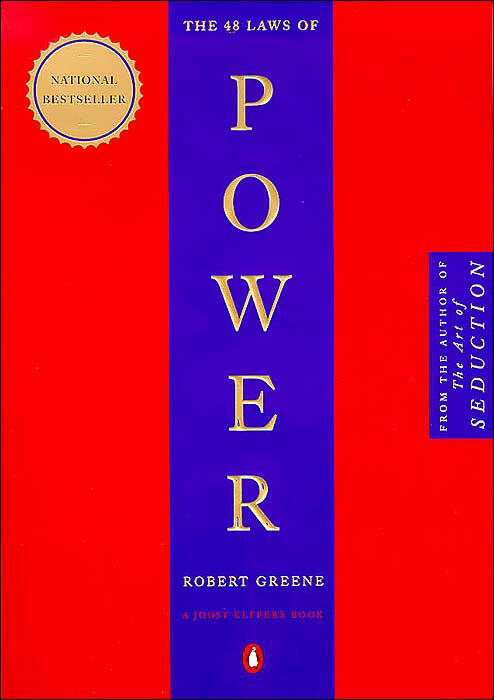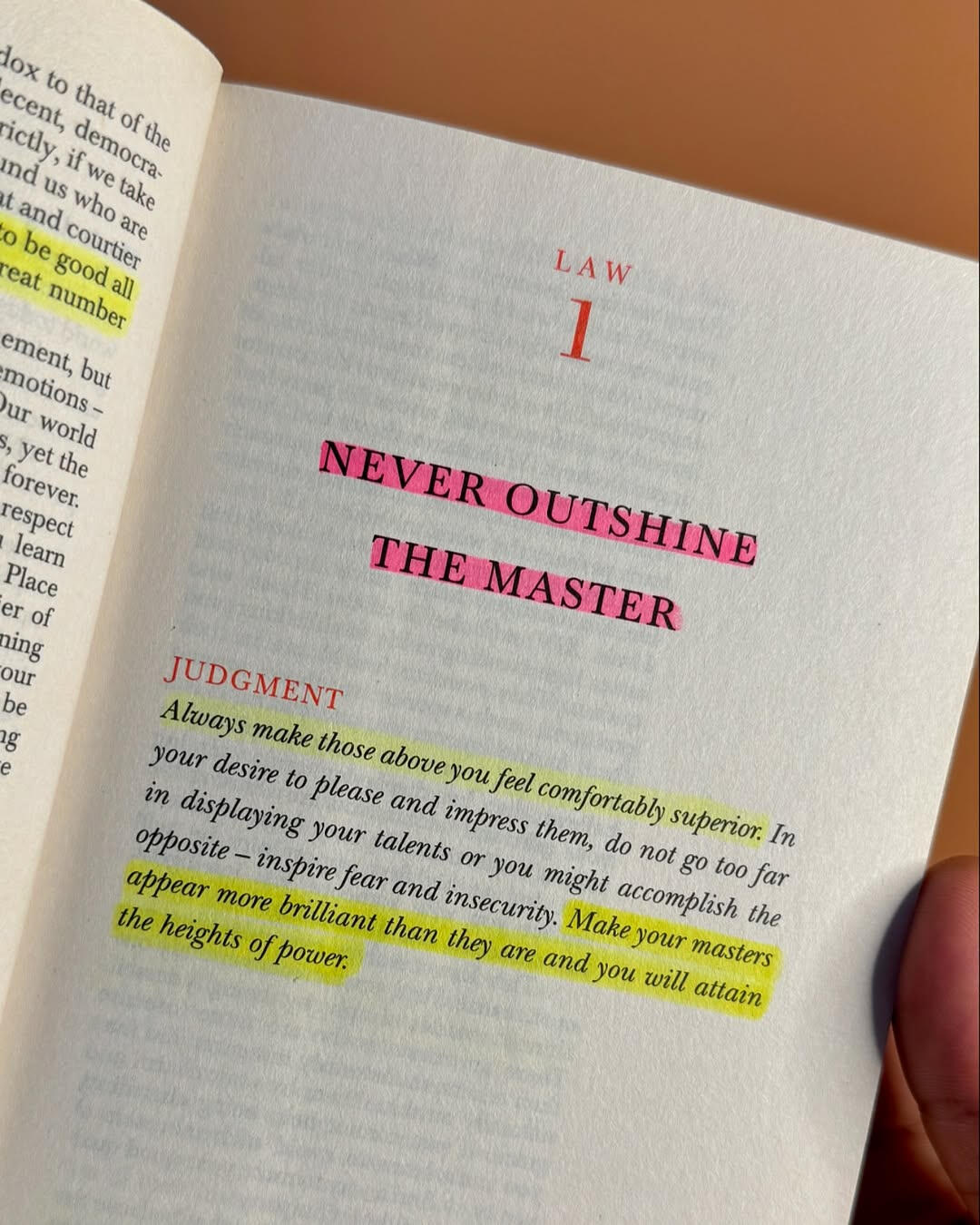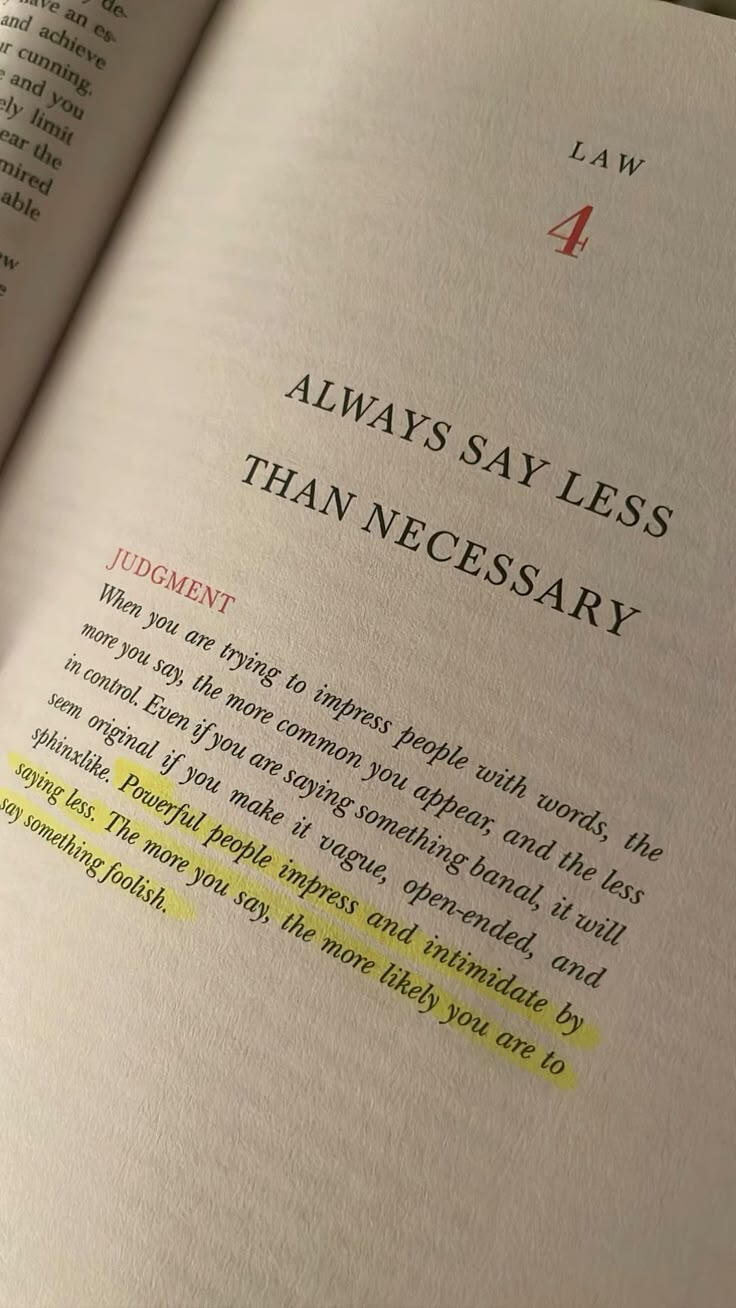The 48 Laws of Power
– Complete Summary & BreakdownRobert Greene’s The 48 Laws of Power is a manual for mastering influence, strategy, and control. Drawing from history’s most powerful leaders, it reveals timeless lessons on power, manipulation, and survival in competitive environments.

Robert Greene
Robert Greene is an American author and speaker, best known for his books on power, strategy, and human behavior. Born on May 14, 1959, in Los Angeles, he gained widespread recognition with his first book, The 48 Laws of Power, published in 1998.




Complete Summary
Imagine we are in a grand, opulent hall, where powerful figures from history gather. You’re observing them, learning their strategies, and gaining insight into the subtle game of power they’ve played throughout the ages. You’re not simply a spectator; you’re about to understand the secrets of how power has shaped the world. This is what The 48 Laws of Power by Robert Greene reveals, telling the story of how to acquire, maintain, and protect power using strategies, both subtle and overt.
Chapter 1: The Court of Kings and Generals
Imagine a grand palace—Louis XIV's court in France. It is filled with opulence, intrigue, and backstabbing. Among the courtiers is Nicolas Fouquet, a man who believes he can surpass the king by throwing the most extravagant party ever seen. He builds a palace that rivals the king’s. Yet, instead of being rewarded, he is imprisoned. This is the result of Law 1: Never Outshine the Master. When you are beneath someone, your role is to make them feel superior. By outshining those above you, you risk not only alienating them but making yourself a target.In the same palace, a few other strategies are unfolding. Law 3: Conceal Your Intentions is at play as courtiers hide their true motivations, knowing that revealing too much can invite suspicion or even opposition. They understand that secrecy, misdirection, and ambiguity give them the upper hand. For instance, a spy in this environment, learning of a rival’s plans, might use Law 13: When Asking for Help, Appeal to Self-Interest to ensure loyalty.The king himself, aware of his power, uses Law 5: Guard Your Reputation with Your Life. In this world, reputation is everything; it’s the very foundation of authority. A single whispered rumor can destroy your position. The king knows this well, and every action, every gesture, is calculated to protect his image. His enemies, however, may use Law 15: Crush Your Enemy Totally, leaving no room for escape, because a wounded enemy can rise again with a thirst for revenge.
Chapter 2: The Art of War and the Chessboard
Now imagine a war room—an austere, quiet place with a giant chessboard where generals strategize. One general, who rules with an iron fist, follows Law 16: Use Absence to Increase Respect and Honor. By staying away from public view, he creates a sense of mystery, and when he returns, his presence commands attention.At the same time, Law 24: Play the Perfect Courtier is being enacted by his aides. They flatter him, ensuring their place by his side. But these courtiers are not fooling anyone. They know that power is about control, not blind loyalty. They understand that Law 18: Do Not Build Fortresses to Protect Yourself. Isolation weakens, and being surrounded by the right people is far more powerful.Yet, not all generals are alike. Some win through sheer strength, using Law 9: Win Through Actions, Not Arguments. They do not waste time in debates but show their power through decisive action. But then there’s the master tactician who believes in Law 28: Enter Action with Boldness. Boldness breeds confidence, and the moment he steps onto the battlefield, everyone knows his power.
Chapter 3: The Kingdoms of Wealth and Deception
You now enter the vast trading halls of Venice, where merchants and financiers use every trick to gain an advantage. In these halls, Law 27: Create a Cult-Like Following is being implemented by the most influential figures. They gather followers not through traditional means, but by crafting an aura of mystery and devotion. These followers would do anything to remain in the good graces of their benefactor, who knows Law 7: Get Others to Do the Work for You, But Always Take the Credit.At the same time, Law 12: Use Selective Honesty to Disarm Others is being used. A businessman may deceive his rivals, but by presenting an honest face in the right moments, he disarms their suspicion. He is not lying at all—he is simply withholding key pieces of information. His actions are always strategically timed.But for others, Law 30: Make Your Accomplishments Seem Effortless is paramount. No one should see the grind behind success, as hard work makes you vulnerable to envy. The true power lies in making everything seem easy and inevitable.
Chapter 4: The Temples of Knowledge and Rebirth
In a quiet study surrounded by ancient books, a scholar contemplates Law 25: Recreate Yourself. In this world, adaptability is power. The scholar knows that to stay relevant, to stay powerful, one must continually evolve. As new ideas emerge, he must discard outdated beliefs and embrace a new identity that suits the times. This is not cowardice; it is survival. It is the ability to shapeshift to match the ever-changing world.At the same time, those who seek to undermine him may use Law 48: Assume Formlessness. The art of formlessness means constantly adapting, blending into the background when necessary. Those who stand too rigidly in one position will be overrun by time, but those who adapt become unstoppable.In the same halls, another scholar uses Law 6: Court Attention at All Costs. This scholar is not content being quiet. He knows that to be truly powerful, he must be seen and heard, creating a persona that draws the attention of the masses.
Chapter 5: The Final Battle
Now, in the final chapter, the strategist reveals his ultimate play. Using Law 22: Use the Surrender Tactic in a moment of weakness, he gives ground, allowing his opponent to feel victorious. But he is playing a long game. In the moment his enemy grows complacent, he strikes decisively, following Law 33: Discover Each Man’s Thumbscrew. He knows exactly what motivates and weakens his opponent, and with a few calculated moves, he secures his victory.He is now at the peak of power, having employed Law 42: Strike the Shepherd, and the Sheep Will Scatter. He knows that removing key figures of influence will scatter their supporters and weaken their opposition.And just as we think he has won, he reminds us of the greatest truth of power: Law 48: Assume Formlessness. The moment you stand still, your power begins to slip. To remain in control, you must continuously adapt, evolve, and shape-shift.In this story of power, from the grand courts of kings to the shadowy halls of merchants, every move is calculated. Every action has consequences. Greene’s 48 laws are not just theories—they are the battle-tested strategies of the powerful, secrets passed down through centuries. The true lesson is not simply how to win power, but how to play the game and remain undefeated, never revealing your hand completely and always controlling the flow of the game.Would you like to delve deeper into any specific law, or perhaps explore how to apply these strategies in your own life?
Practical Applications
Analyze Your Environment: Identify power structures in your workplace or industry.
Control Your Emotions: Never act on impulse; always calculate your moves.
Master Subtlety: Power is often about perception—act with intent, but don’t reveal too much.
Observe and Adapt: Study how others use power and adjust your strategies accordingly.
Use Power Ethically: While the laws can be ruthless, applying them with integrity ensures long-term success.
The 48 laws of Power
🟢 Laws of Caution (Defensive Strategies)
1️⃣ Never Outshine the Master – Make those above you feel superior.
2️⃣ Never Put Too Much Trust in Friends – They can betray; use enemies wisely.
3️⃣ Conceal Your Intentions – Keep others guessing.
4️⃣ Always Say Less Than Necessary – The less you say, the less power you give away.
5️⃣ Guard Your Reputation – It is your strongest asset; defend it at all costs.
6️⃣ Court Attention at All Costs – Visibility = power.
7️⃣ Get Others to Do the Work for You – Leverage their effort, take the credit.
8️⃣ Make Others Come to You – Control the game by forcing others to act.🔴 Laws of Attack (Offensive Strategies)
9️⃣ Win Through Actions, Not Arguments – Prove your power through results.
🔟 Avoid the Unhappy and Unlucky – Misery is contagious.
1️⃣1️⃣ Learn to Keep People Dependent on You – Independence is dangerous.
1️⃣2️⃣ Use Selective Honesty to Disarm Others – Gain trust before manipulating.
1️⃣3️⃣ When Asking for Help, Appeal to Self-Interest – People care about their own benefit.
1️⃣4️⃣ Pose as a Friend, Work as a Spy – Gather intelligence subtly.
1️⃣5️⃣ Crush Your Enemy Totally – Never leave room for revenge.🟠 Laws of Influence & Manipulation
1️⃣6️⃣ Use Absence to Increase Respect and Honor – Rarity creates value.
1️⃣7️⃣ Keep Others in Suspended Terror – Keep them unsure of your next move.
1️⃣8️⃣ Do Not Build Fortresses to Protect Yourself – Isolation is dangerous.
1️⃣9️⃣ Know Who You’re Dealing With – Not everyone reacts the same way.
2️⃣0️⃣ Do Not Commit to Anyone – Stay flexible.
2️⃣1️⃣ Play a Sucker to Catch a Sucker – Appear dumber than you are.🟡 Laws of Self-Preservation
2️⃣2️⃣ Use the Surrender Tactic – When weak, yield temporarily to gain time.
2️⃣3️⃣ Concentrate Your Forces – Focus energy on one decisive move.
2️⃣4️⃣ Play the Perfect Courtier – Master flattery and diplomacy.
2️⃣5️⃣ Recreate Yourself – Reinvent your identity to stay powerful.
2️⃣6️⃣ Keep Your Hands Clean – Avoid direct blame; use scapegoats.
2️⃣7️⃣ Create a Cult-Like Following – Make people depend on you.🔵 Laws of Strategy & Adaptation
2️⃣8️⃣ Enter Action with Boldness – Timidity is dangerous.
2️⃣9️⃣ Plan All the Way to the End – Anticipate obstacles before they arise.
3️⃣0️⃣ Make Your Accomplishments Seem Effortless – Hide hard work.
3️⃣1️⃣ Control the Options – Force people to choose between two favorable choices.
3️⃣2️⃣ Play to People’s Fantasies – People believe what they want to believe.
3️⃣3️⃣ Discover Each Man’s Thumbscrew – Find what motivates or weakens them.
3️⃣4️⃣ Act Like a King to Be Treated Like One – Your confidence shapes perception.
3️⃣5️⃣ Master the Art of Timing – Strike at the right moment.🟣 Laws of Power Mastery
3️⃣6️⃣ Disdain Things You Cannot Have – Ignore what you can’t control.
3️⃣7️⃣ Create Compelling Spectacles – Powerful visuals create strong impressions.
3️⃣8️⃣ Think as You Like, But Behave Like Others – Fit in before standing out.
3️⃣9️⃣ Stir Up Waters to Catch Fish – Create confusion and take advantage of it.
4️⃣0️⃣ Despise the Free Lunch – What’s free is often a trap.
4️⃣1️⃣ Avoid Stepping Into a Great Man’s Shoes – Create your own identity.
4️⃣2️⃣ Strike the Shepherd, and the Sheep Will Scatter – Eliminate key figures first.
4️⃣3️⃣ Work on the Hearts and Minds of Others – Win loyalty with persuasion.
4️⃣4️⃣ Disarm and Infuriate with the Mirror Effect – Reflect people’s behavior back at them.
4️⃣5️⃣ Preach the Need for Change, But Never Reform Too Much at Once – Gradual change is accepted more easily.
4️⃣6️⃣ Never Appear Too Perfect – Envy leads to attacks.
4️⃣7️⃣ Do Not Go Past the Mark You Aimed For – Know when to stop.
4️⃣8️⃣ Assume Formlessness – Adapt constantly to stay ahead.

Briffio
Discover the Best summary on briffio.com
© Briffio. All rights reserved.